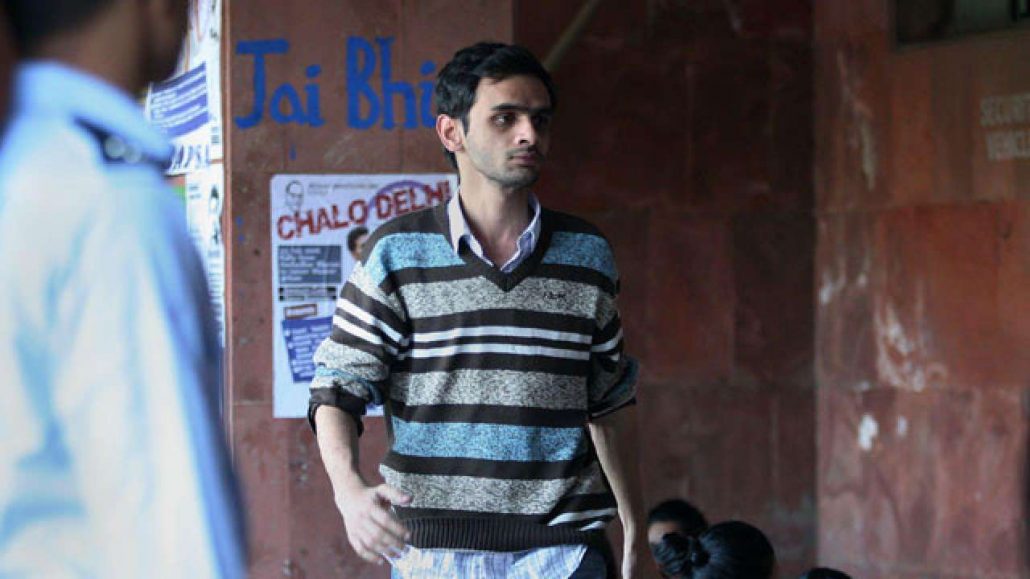
Earlier on Monday, JNU student activist and infamous ‘anti-national’ Umar Khalid was shot at outside the Constitution Club in New Delhi. Although Khalid escaped the attempt unscathed, he narrated, in vivid and harrowing detail, how he was confronted by a band of men at a tea kiosk outside the club, one of whom, an unidentified man in a white shirt, was carrying a gun. Khalid tussled with the assailant in his struggle to overpower him; eventually, with the help of Khalid’s friends at the kiosk, this was accomplished and the man escaped, dropping his gun in the process.
This was, however, not before a shot was said to have been unsuccessfully fired at Khalid. The police are now attempting to verify if this aspect of the incident was true.
Khalid, who looked characteristically undeterred in his expression, spoke of the force of his sentimentality when the gun was first pointed at him – he felt, Khalid said, that his moment, like Gauri Lankesh’s, had arrived. Yet, for Khalid, this was but a manifestation of what he has been threatened with ever since the so-called JNU incident in February 2016, in which Khalid was arrested for his participation in a gathering commemorating, in mourning, the death of Afzal Guru. Death threats have come from innumerable quarters, from passersby in the streets to showmen in television newsrooms.
It is noteworthy that Khalid was at the Constitution Club, a mile or so away from Parliament, to attend a public discussion titled Khauf se Azaadi, an event organised under the auspices of the United Against Hate collective. The event bemoaned the loss of freedom from fear under the present political dispensation, featuring panelists such as Prashant Bhushan, Professor Apoorvanand, Najeeb Ahmed’s mother Fatima Nafees, Rohit Vemula’s mother Radhika Vemula, and Dr Kafeel Khan. In the attack on Umar Khalid’s life at an event against fear and for freedom, the act is the message.
Political establishments and liberal regimes have historically been suspicious of the figure of the student whose conformity has been seen, in many ways, as constitutive of the society and the nation. The student, at the cusp of working adulthood and only a moment away from childhood, is conceptualised as a resource to be delivered into appropriate lines of labour, gender, class, and citizenship. This is why the public university, or the nation, demands an apolitical studentship which does not disobey, let alone agitate and protest. If the student refuses conformity, every transgression is punishable, usually by hauntingly juridical means. In this history, India’s colonial and postcolonial governments have all been complicit – students have, for the crime of dissenting, been water-cannoned, lathi-charged, jailed, even killed. One needs only to remember Indira Gandhi’s political emergency, a spectacle as harrowing as our present circumstance.
Yet, rarely in India has fear – and the enormity of threat not only to the dissenting student, but anyone dissenting – been as palpable and potent. Ever since the present government came to realise that it faces a sizeable student representation against its ideological work and apparatus, it has taken peculiar delight in denuding both the student and his/her world. This has been evident in the affront against the public university, whose days in the country seem painfully numbered.
To dissent is now to be anti-national, and to be anti-national is to be criminal beyond recourse or pardon. Persecution is awarded not only on social media where abuse, ‘trolling,’ and threats of murder and rape are routinely issued by foot-soldiers of what looks like a deeply ideological regime, but also on the streets where, as Umar Khalid found out, life hangs in precarious balance. In the dispensation’s crudely careful silence on rapidly mushrooming instances of lynching by the power of the mob, there is the template of a politics which thrives in a culture of fear and political alienation. This is what emboldens and empowers ‘unidentified’ men of disparate calling but singular political motivation to take the law, and the life of another, into their hands.
The unsuccessful attack on Umar Khalid, in consonance with the successful attacks on Gauri Lankesh, MM Kalburgi, Govind Pansare, and many others, is reflective of a tragic poignancy. It unfolds the complicity of the political establishment, but more widely, of those in newsrooms, auditoria, even classrooms who perpetuate fear and acerbic hatred with brazen ignorance and impunity, of those, like so many of us, who will choose to look away. That a student, dissenting or otherwise, is shot at near Parliament and two days before the nation commemorates its independence is a commentary both on us and the nation.




